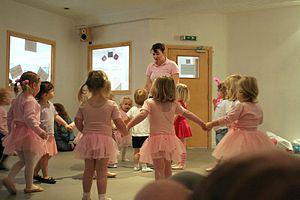How effective is it really for young learners to learn a new language? Does it really make it easier for them to acquire a new language when they are enrolled to foreign language schools? For the past articles related to young learners learning new languages comparing adults, the younger ones always show more excellent results when it comes to progression.
But, according to Center for Applied Linguistics (CAL), there are some characteristics about young language learners—particularly to those who are learning English language that are important; thus useful for educators to keep it in mind.

Image by CarolSpears via Wikipedia
You want to know the details? Here are the lists.
Young children’s first language is not yet fully developed
According to the source, children between 5 and 10 years old are still acquiring the structures of their first language. It was even detailed that children younger than 5 years old have many aspects of their first language have not yet fully developed. “So while older learners have the foundation of a fully developed first language when they begin acquiring a new language, younger English language learners are working toward two milestones at the same time: the full development of their native language and the acquisition of English.”
The writer emphasized this: “While children are perfectly capable of acquiring two or more languages, and there is no evidence that this process produces any negative consequences—in fact, in many parts of the world it is the norm, rather than the exception, for children to grow up bilingual or multilingual—educators must keep in mind that young children do not have a fully developed native language on which to base the learning of a second. Children may not know certain vocabulary words, grammatical structures, or other language features in their native language before they learn them in English, in which case merely translating a word or phrase may be of little help to them.
Children need to develop their native language(s) along with English
My Dad once argued with me how young learners should not integrate a foreign language along with their native language. He exclaimed that it would only confuse the young learner. Well, as for the source of this article, I strongly contradict such thought.
Young learners can naturally learn their native language due to various immersion factors like communication with parents, socializing with other people along the community, and so on. So in order to develop their native language skills fully, young English language learners need support in both their native language and English.
No matter how young your child may be, as long as he is as typical as you and me, he will not have so many difficulties in leaning English language. If you want, you can let him go to a language school for a more comprehensive way of learning.

